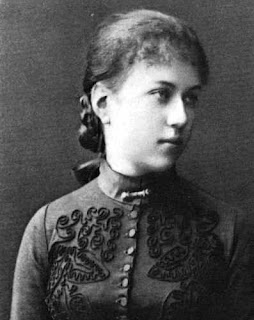 Alexandra Kollantai was the most prominent woman in the Soviet administration during her lifetime. Originally a Menshevik who was exiled in America and Scandinavia, Kollantai joined the Bolsheviks in 1914 and returned to Russia. After the Bolshevik Revolution, she was appointed People's Commissar for Social Welfare. In this position of power, she created the Zhenotdel (Women's Department) in 1919 - an organization which fought for literacy and to educate women about the new laws concerning marriage, education, and employment which were put in place by the Revolution. She made history and became the world's first female ambassador when she was appointed Soviet ambassador to Europe. Although Stalin merely used this appointment to effectively exile her from Russia, her appointment to this office was significant. Kollantai was also a member of the Soviet delegation to the League of Nations. She strongly promoted free love; she believed that for a socialist revolution to truly occur, radical change must be made concerning the way in which sexuality was viewed. She is also relevant for her radical view of marriage as a relic of the oppressive past. She believed that once the ideal democracy was created by the Communists, the notion of a family unit would wither away. She encouraged mothers to believe in the notion of not personally possessing children and believed that there would be "...only our children, children of Russia's communist workers." The political power she held was remarkable for a woman in the early 20th century - especially in a backward country like Russia - and her belief in a liberated woman who was not tied down to the traditional concept of family was truly revolutionary.
Alexandra Kollantai was the most prominent woman in the Soviet administration during her lifetime. Originally a Menshevik who was exiled in America and Scandinavia, Kollantai joined the Bolsheviks in 1914 and returned to Russia. After the Bolshevik Revolution, she was appointed People's Commissar for Social Welfare. In this position of power, she created the Zhenotdel (Women's Department) in 1919 - an organization which fought for literacy and to educate women about the new laws concerning marriage, education, and employment which were put in place by the Revolution. She made history and became the world's first female ambassador when she was appointed Soviet ambassador to Europe. Although Stalin merely used this appointment to effectively exile her from Russia, her appointment to this office was significant. Kollantai was also a member of the Soviet delegation to the League of Nations. She strongly promoted free love; she believed that for a socialist revolution to truly occur, radical change must be made concerning the way in which sexuality was viewed. She is also relevant for her radical view of marriage as a relic of the oppressive past. She believed that once the ideal democracy was created by the Communists, the notion of a family unit would wither away. She encouraged mothers to believe in the notion of not personally possessing children and believed that there would be "...only our children, children of Russia's communist workers." The political power she held was remarkable for a woman in the early 20th century - especially in a backward country like Russia - and her belief in a liberated woman who was not tied down to the traditional concept of family was truly revolutionary.Picture: http://en.wikipedia.org/wiki/Image:AlexandraKollantaiLarge.jpeg
6 comments:
what is it with you and fancy hard to read colors?
better?
Were there other women who shared Kollantai's notion of free love? Where would she have obtained such radical beliefs? What were the opinions of her male counterparts of her? What significant impact did she have besides her appointment to positions despite being a woman? Is it really an accomplishment if the position carries no extra responsibility other than effective removal? What were other women doing during this period? How is Kollantai revered in Russia? Was kollantai ever married or did she ever have children? Were Kollantai's beliefs on marriage and family shared at all by the Bolshevik party?
Good questions. Kollantai's notion of free love was not what some would interpret that same idea today: she simply thought that attitudes toward sexuality should be revolutionized if a socialist or communist revolution were to occur. In other words, she didn't draw a lot of criticism because her ideas weren't too controversial in the revolutionary minded Russian government. Most of her significance is drawn from the fact that she was such a prominent woman in the government and that she established an organization dedicated to the rights of women. Kollantai's political ties with specific parties mostly were because she saw the need to side with the party in power. After all, she was a Menshevik and then became a Bolshevik. She was not really that well received in Russia near the end of her life but she was curiously never killed in the purges. I'm not sure about her marriage, but her given name was Domontovich, so she must have been married at some point.
Why thank you, Will, for responding so speedily to my queries. I can't wait to see YOUR presentation before Spring Break.
Post a Comment